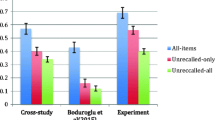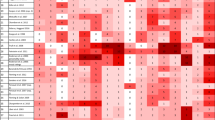Abstract
This study examined the reliability and reactivity of participant observation. Twelve couples engaged in two discussions in a laboratory, one on a conflict topic and one on a consensus topic. For the eight couples in the experimental sequences, a baseline discussion was followed by participant observation in which the husband recorded his wife's use of “I” while continuing to converse. The four couples in the control sequences conversed without participant observation. Compared to observations made by a trained observer, the husbands were unreliable observers, underestimating their wives' use of “I.” Participant observation was reactive (P<.01), with more wives decreasing their use of “I” in the experimental sequences than in the control sequences (p<.094). The topic of discussion did not differentially influence reliability or reactivity.
Similar content being viewed by others
References
Christensen, A., & Nies, D. C. (1980). The Spouse Observation Checklist: Empirical analysis and critique.American Journal of Family Therapy, 8 69–79.
Floyd, F. J., & Markman, H. J. (1983). Observational biases in spouse observation: Toward a cognitive/behavioral model of marriage.Journal of Consulting and Clinical Psychology, 51 450–457.
Frederiksen, L. W., Epstein, L. H., & Kosevsky, B. P. (1975). Reliability and controlling effects of three procedures for self-monitoring smoking.The Psychological Record, 25 255–264.
Gottman, J. M. (Undated).Couples' Problem Inventory. Unpublished manuscript. (Available from the author, Child Research Center, University of Illinois, Champaign, Urbana, Il 61801.)
Hay, L. R., Nelson, R. O., & Hay, W. M. (1977). Some methodological problems in the use of teachers as behavioral observers.Journal of Applied Behavior Analysis, 10 345–348.
Hay, L. R., Nelson, R. O., & Hay, W. M. (1980). Methodological problems in the use of participant observers.Journal of Applied Behavior Analysis, 13 501–504.
Hayes, S. C., & Cavior, N. (1977). Multiple tracking and the reactivity of self-monitoring. I. Negative behaviors.Behavior Therapy, 8 819–831.
Hayes, S. C., & Cavior, N. (1980). Multiple tracking and the reactivity of self-monitoring. II. Positive behaviors.Behavioral Assessment, 2 283–296.
Haynes, S. N., & Wilson, C. C. (1979).Behavioral Assessment. San Francisco: Jossey-Bass.
Jacobson, N. S. (1977). Problem solving and contingency contracting in the treatment of marital discord.Journal of Consulting and Clinical Psychology, 45 92–100.
Jacobson, N. S. (1979). Increasing positive behavior in severely distressed adult relationships.Behavior Therapy, 10 311–326.
Jacobson, N. S., & Moore, D. (1981). Spouses as observers of the events in their relationship.Journal of Consulting and Clinical Psychology, 49 269–277.
Kent, R. N., & Foster, S. L. (1977). Direct observation procedures: Methodological issues in naturalistic settings. In A. R. Ciminero, K. S. Calhoun, & H. E. Adams (Eds.),Handbook of behavioral assessment (pp. 279–328). New York: Wiley.
Locke, H. J., & Wallace, K. M. (1959). Short marital adjustment and prediction tests: Their reliability and validity.Marriage and Family Living, 21 251–255.
Margolin, G. (1978). A multilevel approach to the assessment of communication positiveness in distressed marital couples.International Journal of Family Counseling, 6 81–89.
Margolin, G., & Weiss, R. L. (1978). A comparative evaluation of therapeutic components associated with behavioral marital treatment.Journal of Consulting and Clinical Psychology, 46 1476–1486.
Nelson, R. O. (1977). Assessment and therapeutic functions of self-monitoring. In M. Hersen, R. M. Eisler, & P. M. Miller (Eds.),Progress in behavior modification (pp. 263–308). New York: Academic, Vol. 5.
Nelson, R. O. (1983). Behavioral assessment: Past, present, and future.Behavioral Assessment, 5 195–206.
Robinson, E. A., & Price, M. G. (1980). Pleasurable behavior in marital interaction: An observational study.Journal of Consulting and Clinical Psychology, 48 117–118.
Siegel, S. (1956).Nonparametric statistics for the behavioral sciences. New York: McGraw-Hill.
Stuart, R. B. (1980).Helping couples change. New York: Guilford.
Volkin, J. I., & Jacob, T. (1981). The impact of spouse monitoring on target behavior and recorder satisfaction.Journal of Behavioral Assessment, 3 99–109.
Author information
Authors and Affiliations
Additional information
This research was conducted as the first author's independent doctoral research project. We extend gratitude to the Research Council of the University of North Carolina at Greensboro for Grant 0-2-110-218-XXXXX-7548; the Statistical Consulting Center of the University of North Carolina at Greensboro; two anonymous reviewers; and our research assistants, Suzanne Brannon, Ben Hardie, Kathy Lindamood, Amy Mitchem, Regina Pierce, and Elga Wulfert. Portions of this paper were presented at the meeting of the Association for Advancement of Behavior Therapy, Washington, D.C., December 1983.
Rights and permissions
About this article
Cite this article
Jarrett, R.B., Nelson, R.O. Reactivity and unreliability of husbands as participant observers. Journal of Behavioral Assessment 6, 131–145 (1984). https://doi.org/10.1007/BF01350168
Accepted:
Issue Date:
DOI: https://doi.org/10.1007/BF01350168




